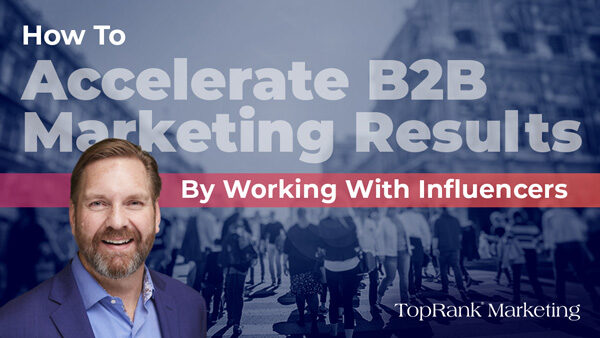How can B2B marketers successfully go all-in on a digital-first strategy, and why is it more important today than ever?
Our CEO and co-founder Lee Odden recently shared some of his insight on digital transformation in B2B marketing, and what marketers can do to best adapt and utilize the new opportunities that digital-first presents.
Let’s jump right in and learn some of the top ways that B2B marketers can make a successful transition to digital-first.
Here’s a recent question and answer session featuring Lee digging in to some of the ways that B2B marketers can go all-in on today’s digital-first buyers.
The Road To Digital-First B2B Buyers
Question: How have you evolved over the course of time with what you specialize in with your clients?
Lee: You know, that’s a great question given that we’re 20 years old this year. We have absolutely changed and transformed, and starting as a dual-purpose agency — with SEO and PR, unlikely bedfellows — way back in 2001, we started to do a lot more content, because there wasn’t a lot to optimize with an increasing number of websites.
So we really got into the content development, and social media business, and then in the last eight years or so, we’ve really focused on the intersection of content that is optimized for findability, but also optimized for credibility. And that means working with industry influencers in our case, working specifically with B2B companies.
Question: In B2B, it’s very important to have the right content so that people get a sense of who you are, how you can help them, and if you’re speaking the same language. Is there anything in particular that you focus on with your clients regarding what type of content that they should be providing?
Lee: It comes down to having some understanding of what it is that’s going to motivate the customer. We look at data to understand what are the customer preferences in terms of information discovery and content consumption, and the triggers that motivate action.
That then can manifest into a B2B content architecture that consists of things like white papers, case studies, and reports — from a thought leadership standpoint these are very important.
Then we get into the middle of funnel, and we start looking at more engaging content like video. Video’s probably the hottest area in B2B, with live-stream, video, recorded video webinars, virtual events, and those types of video content. We’ve also gotten into virtual reality content.
With text, audio, podcasts, video, and more, it really comes down to what’s important for the customer. What are their preferences in terms of discovery, consumption, and action.
Question: Are there things you see coming down the pike in the next couple of years that companies should be focusing on within their marketing, and specifically the content they’re providing?
Lee: With our emphasis on B2B, the pandemic and COVID has rapidly digitally transformed the industry, and that has affected marketing as well. Overnight, companies are realizing that their buyers are digital-first, meaning that they are using digital channels to do that discovery and consumption, and taking action.
Ecommerce in B2B is probably one of the hottest growth areas. Over the next couple of years, B2B companies and B2B marketers are going to have to pay attention to those changing focuses on digital media.
Another area of focus I think, is that there’s a greater expectation amongst buyers to be involved, meaning that they don’t want to just find what they’re looking for through search or see a great ad. Many want to actually be involved in making the content.
I know that sounds weird, but it’s kind of like user generated content (UGC), or employee advocacy on steroids. There’s this idea of participative marketing, a kind of collaborative marketing where B2B brands start to tap the expertise inside their company.
They tap the expertise of their community of customers, and they tap the expertise of industry experts, to create the kind of content that people actually want to consume, as opposed to just formal advertising brand messaging, which virtually nobody trusts anymore.
Make Digital-First Your First Choice For B2B Marketing Success
If you’d like to talk with us directly about how to improve your own digital-first influencer, search, and content marketing performance as we have done for B2B brands ranging from Adobe to LinkedIn, please connect with us here.
Additionally, to learn more about the rising power of influence in B2B, watch Lee in our comprehensive webinar “How to Accelerate B2B Marketing Results by Working With Influencers,” and learn how to create greater marketing impact with influence.



